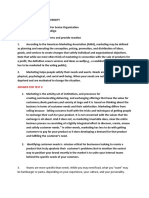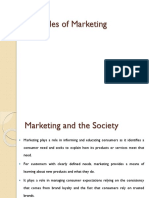0 ratings0% found this document useful (0 votes)
34 viewsChapter One: Overview of The Marketing Management
Chapter One: Overview of The Marketing Management
Uploaded by
goshuThis document discusses key concepts in marketing management including definitions of marketing, the marketing concept, and different philosophies that guide marketing efforts. It defines marketing as a social and managerial process where individuals obtain goods and services to satisfy needs and wants. [Marketing management is the planning and execution of marketing strategies related to product, price, place, and promotion.] The four main philosophies discussed are the production concept, product concept, selling concept, and marketing concept. The marketing concept holds that organizations should focus on creating and delivering superior customer value to chosen target markets.
Copyright:
© All Rights Reserved
Available Formats
Download as PPTX, PDF, TXT or read online from Scribd
Chapter One: Overview of The Marketing Management
Chapter One: Overview of The Marketing Management
Uploaded by
goshu0 ratings0% found this document useful (0 votes)
34 views20 pagesThis document discusses key concepts in marketing management including definitions of marketing, the marketing concept, and different philosophies that guide marketing efforts. It defines marketing as a social and managerial process where individuals obtain goods and services to satisfy needs and wants. [Marketing management is the planning and execution of marketing strategies related to product, price, place, and promotion.] The four main philosophies discussed are the production concept, product concept, selling concept, and marketing concept. The marketing concept holds that organizations should focus on creating and delivering superior customer value to chosen target markets.
Original Description:
marketing ch-3
Original Title
chapter one
Copyright
© © All Rights Reserved
Available Formats
PPTX, PDF, TXT or read online from Scribd
Share this document
Did you find this document useful?
Is this content inappropriate?
This document discusses key concepts in marketing management including definitions of marketing, the marketing concept, and different philosophies that guide marketing efforts. It defines marketing as a social and managerial process where individuals obtain goods and services to satisfy needs and wants. [Marketing management is the planning and execution of marketing strategies related to product, price, place, and promotion.] The four main philosophies discussed are the production concept, product concept, selling concept, and marketing concept. The marketing concept holds that organizations should focus on creating and delivering superior customer value to chosen target markets.
Copyright:
© All Rights Reserved
Available Formats
Download as PPTX, PDF, TXT or read online from Scribd
Download as pptx, pdf, or txt
0 ratings0% found this document useful (0 votes)
34 views20 pagesChapter One: Overview of The Marketing Management
Chapter One: Overview of The Marketing Management
Uploaded by
goshuThis document discusses key concepts in marketing management including definitions of marketing, the marketing concept, and different philosophies that guide marketing efforts. It defines marketing as a social and managerial process where individuals obtain goods and services to satisfy needs and wants. [Marketing management is the planning and execution of marketing strategies related to product, price, place, and promotion.] The four main philosophies discussed are the production concept, product concept, selling concept, and marketing concept. The marketing concept holds that organizations should focus on creating and delivering superior customer value to chosen target markets.
Copyright:
© All Rights Reserved
Available Formats
Download as PPTX, PDF, TXT or read online from Scribd
Download as pptx, pdf, or txt
You are on page 1of 20
Chapter one :
Overview of the marketing management
1. what do you know about market and marketing and
marketing management ?
Definition of Marketing
Marketing can be defined by social and managerial
aspect :
marketing is a societal process by which individuals
and groups obtain what they need and want through
creating, offering, and exchanging products and
services of value freely with others.
Whereas the managerial definition is that ;
it is the art of selling.
Generally marketing means meting the customers
need profitability.
Cont’d…
Marketing (management) is the process of planning
and executing the conception, pricing, promotion,
and distribution of ideas, goods, and services to
create exchanges that satisfy individual and
organizational goals.
1.1. The Scope of Marketing
Marketing people are involved in marketing 10 types of
entities:
goods,
services,
experiences,
events,
persons,
places,
properties,
organizations,
information, and ideas.
Core Marketing Concepts
Marketing can be further understood by defining the core
concepts applied by marketing managers.
1. Target Markets and Segmentation
2. marketplace and a market space
3. meta market, describes a cluster of complementary
products and services that are closely related in the minds of
consumers but are spread across a diverse set of industries
4. Needs, Wants, and Demands:
5. Product or Offering:
Cont’d…
5. Product or Offering
People satisfy their needs and wants with products.
A product is any offering that can satisfy a need or
want
6. Value and Satisfaction
• Value =Benefits/cost
Benefits of the customers are :Functional benefits
and emotional benefits
Costs of the customers are: Monetary costs, time
costs, energy costs and psychic costs
Cont’d…
the marketer can increase the value of the
customer offering by:
(a) raising benefits,
(b) reducing costs,
(c) raising benefits and reducing costs,
(d) Raising benefits by more than the raise in costs,
or
(e) lowering benefits by less than the reduction in
costs.
Cont’d…
7.Exchange and Transactions
8. Relationships and Networks
9. Marketing Channels
10. Competition
11.Marketing environment
12. Marketing mix
cont’d…
Robert Lauter born suggested that the sellers’ four Ps
correspond to the customers’ four Cs.
Four Ps Four Cs
• Product Customer solution
• Price Customer cost
• Place Convenience
• Promotion Communication
Marketing management philosophy
Marketing management is the conscious effort to
achieve desired exchange outcomes with target
markets.
1. what philosophy should guide a company’s
marketing efforts?
2. What relative weights should be given to the often
conflicting interests of the organization, customers,
and society?
Cont’d…
marketing activities should be carried out under a well-
thought-out philosophy of efficient, effective, and
socially responsible marketing.
In fact, there are five competing concepts under which
organizations conduct marketing activities:
1. Production concept,
2. product concept,
3. selling concept,
4. marketing concept, and
5. societal marketing concept.
1. Production concept
It holds that consumers prefer products that are widely
available and inexpensive.
Managers of production-oriented businesses concentrate
on achieving high production efficiency, low costs, and
mass distribution.
This orientation makes sense in developing countries,
where consumers are more interested in obtaining the
product than in its features
• What is the market myopia of this concept?
2. Product concept
it holds that consumers favor those products that offer
the most quality, performance, or innovative features.
in these organizations focus on making superior products
and improving them over time, assuming that buyers can
appraise quality and performance.
Product-oriented companies often design their products
with little or no customer input, trusting that their
engineers can design exceptional products.
• What is the drawback of product concept?
3. The Selling Concept
It holds that consumers and businesses, if left alone,
will ordinarily not buy enough of the organization’s
products.
The organization must, therefore, undertake an
aggressive selling and promotion effort.
This concept assumes that consumers must be coaxed
into buying, so the company has a battery of selling
and promotion tools to stimulate buying.
Cont’d…
The selling concept is practiced most aggressively with
unsought goods—goods that buyers normally do not think
of buying, such as insurance and funeral plots.
The selling concept is also practiced in the nonprofit area by
fund-raisers, college admissions offices, and political
parties.
Most firms practice the selling concept when they have
overcapacity. Their aim is to sell what they make rather
than make what the market wants.
In modern industrial economies, productive capacity has
been built up to a point where most markets are buyer
4.marketing concept
It holds that the key to achieving organizational goals
consists of the company being more effective than its
competitors in creating, delivering, and communicating
customer value to its chosen target markets.
It is an outside in perspectives.
5. The Societal Marketing Concept
Some me have questioned whether the marketing concept
is an appropriate philosophy in an age of environmental
deterioration, resource shortages, explosive population
growth, world hunger and poverty, and neglected
social services.
Are companies that successfully satisfy consumer wants
necessarily acting in the best, long-run interests of
consumers and society?
The marketing concept side steps the potential conflicts
among consumer wants, consumer interests, and long-run
societal welfare.
Thanks !
You might also like
- Lulu One Deception To Rule Them All PDFDocument452 pagesLulu One Deception To Rule Them All PDFDave Burgzorg100% (6)
- First Exam ReviewDocument37 pagesFirst Exam ReviewAustin Joseph100% (1)
- Chapter One: Overview of The Marketing ManagementDocument19 pagesChapter One: Overview of The Marketing Managementalazar suffaNo ratings yet
- MKTG CH - 1 PPT (1)Document37 pagesMKTG CH - 1 PPT (1)yashiralmeseleNo ratings yet
- Ch-1 PPT Principles of MKTDocument22 pagesCh-1 PPT Principles of MKTBamlak WenduNo ratings yet
- BMK 2102 Marketing Operatiions Notes Jan-Apr 2020Document59 pagesBMK 2102 Marketing Operatiions Notes Jan-Apr 2020Kelvin MakauNo ratings yet
- CH 1 Define MarketingDocument38 pagesCH 1 Define MarketingCave BosNo ratings yet
- BA4207 MArketing Management NotesDocument143 pagesBA4207 MArketing Management Notesmuthuselvamcr007No ratings yet
- Zeeshan-15 Consumer BehaviorDocument9 pagesZeeshan-15 Consumer BehaviorZeeshanNo ratings yet
- Chapter FiveDocument60 pagesChapter Fivetot stephenNo ratings yet
- 8 Marketing ManagementDocument146 pages8 Marketing ManagementAadarshini Gupta100% (1)
- MarketingDocument75 pagesMarketingFarhanRazaNo ratings yet
- Bba 201 Principles of MarketingDocument42 pagesBba 201 Principles of MarketingBrian MutuaNo ratings yet
- Marketing ConceptDocument12 pagesMarketing ConceptPresidency Student Forum100% (2)
- Principle of Marketing and Consumer BehaviorDocument100 pagesPrinciple of Marketing and Consumer BehaviorAddaa WondimeNo ratings yet
- Marketing Chapter 1Document46 pagesMarketing Chapter 1Torifur Rahman BiplobNo ratings yet
- .Priciple Marketing Tutor PPT 2024 1713640768000Document30 pages.Priciple Marketing Tutor PPT 2024 1713640768000gemexkooNo ratings yet
- Principles of Marketing Lesson 1Document5 pagesPrinciples of Marketing Lesson 1Harmonica PellazarNo ratings yet
- Chapter 1 SummaryDocument15 pagesChapter 1 SummaryIbrahim Tahayna100% (1)
- Holistic Marketing: Home Help Sign inDocument31 pagesHolistic Marketing: Home Help Sign inPiyadi Gamage IndikaNo ratings yet
- MM1 - Marketing ManagementDocument69 pagesMM1 - Marketing Managementkumar1992prashantNo ratings yet
- Chapter 1 MKG KotlerDocument10 pagesChapter 1 MKG Kotlersara100% (1)
- Principle of MarketingDocument28 pagesPrinciple of Marketingzekarias wondafrashNo ratings yet
- Principles of Marketing BMKT300 CH1Document56 pagesPrinciples of Marketing BMKT300 CH1Karim KobeissiNo ratings yet
- MarketingDocument76 pagesMarketingAmanNo ratings yet
- Chapt 1Document11 pagesChapt 1RajKamNo ratings yet
- Scope of MarketingDocument105 pagesScope of MarketingTausif HussainNo ratings yet
- Chapter 5Document22 pagesChapter 5AYNETU TEREFENo ratings yet
- Marketing PhilosophiesDocument3 pagesMarketing Philosophiesogenrwotronald10No ratings yet
- MarketingDocument17 pagesMarketingYash gawasNo ratings yet
- CH 5 MarketingDocument71 pagesCH 5 MarketingEsayas NashaNo ratings yet
- Enter CH - 5 PPT NewDocument40 pagesEnter CH - 5 PPT NewGemechis GurmesaNo ratings yet
- Marketing For TourismDocument60 pagesMarketing For TourismNurhusienNo ratings yet
- Answer For Test IiDocument6 pagesAnswer For Test IiDianne DiezmoNo ratings yet
- The Scope of MarketingDocument12 pagesThe Scope of MarketingAdharsh ManagotNo ratings yet
- Marketing Chapter 1 NoteDocument8 pagesMarketing Chapter 1 NoteBIT CITENo ratings yet
- COMMERCIAL STUDIES NOTES 3Document16 pagesCOMMERCIAL STUDIES NOTES 3Young sue kheyNo ratings yet
- Principles of Marketing Lecture Note (1)Document5 pagesPrinciples of Marketing Lecture Note (1)Amani ZerishNo ratings yet
- MKT MGT Chapter OneDocument46 pagesMKT MGT Chapter Oneዋለልኝ አድማሱ ተገኘNo ratings yet
- Mbmi 12 Marketing Management: Course Instructor: DR - Sundara Bala Murugan.PDocument34 pagesMbmi 12 Marketing Management: Course Instructor: DR - Sundara Bala Murugan.PPavan ReshmanthNo ratings yet
- An Overview of Marketing: Kanwal Gurleen Lecturer, LSBDocument59 pagesAn Overview of Marketing: Kanwal Gurleen Lecturer, LSBayuekamalNo ratings yet
- MM - Unit 1Document22 pagesMM - Unit 1Sparsh SaxenaNo ratings yet
- Marketing Management My SummeryDocument79 pagesMarketing Management My SummeryAhmedFawzy100% (1)
- Lipton (57-63)Document292 pagesLipton (57-63)Sarah ShaikhNo ratings yet
- Chapter 1-3 Review Notes MGN 2210Document8 pagesChapter 1-3 Review Notes MGN 2210KaiNo ratings yet
- Fundamentals of Marketing NotebookDocument24 pagesFundamentals of Marketing NotebookMorrisa AlexanderNo ratings yet
- CH 1Document42 pagesCH 1Rana HarisNo ratings yet
- Marketing and SocityDocument15 pagesMarketing and SocityHaris KhanNo ratings yet
- CH 5 NewDocument42 pagesCH 5 NewEliyas BeniyamNo ratings yet
- Chapter One An Overview of Marketing and Marketing ManagementDocument57 pagesChapter One An Overview of Marketing and Marketing ManagementVijayakumar ManiNo ratings yet
- Marketing Management Book 1ST Sem MbaDocument273 pagesMarketing Management Book 1ST Sem MbaSaurav KhuranaNo ratings yet
- Company Orientations Towards The Market Place: A DiscussionDocument3 pagesCompany Orientations Towards The Market Place: A DiscussionOm PatelNo ratings yet
- Overview of MarketingDocument10 pagesOverview of Marketingbetsyalton8No ratings yet
- Chapter 5Document61 pagesChapter 5kirubel solomonNo ratings yet
- Holistic Marketing ConceptDocument8 pagesHolistic Marketing ConceptAmol Pramodrao ThakareNo ratings yet
- Unit 1 Question BankDocument16 pagesUnit 1 Question Bankdeeksha6548gkNo ratings yet
- Chapter 3 &4Document98 pagesChapter 3 &4Kebede ChallaNo ratings yet
- Experiential Marketing (Review and Analysis of Schmitt's Book)From EverandExperiential Marketing (Review and Analysis of Schmitt's Book)Rating: 5 out of 5 stars5/5 (1)
- Strategies For Branding Success: Give Your Brand the Competitive Edge to Succeed In Today's Challenging EconomyFrom EverandStrategies For Branding Success: Give Your Brand the Competitive Edge to Succeed In Today's Challenging EconomyNo ratings yet
- The Secret Journey of Marketing: Unveiling the Magical Secrets of Marketing World for Beginners. A Complete Guide to the Marketing Universe.From EverandThe Secret Journey of Marketing: Unveiling the Magical Secrets of Marketing World for Beginners. A Complete Guide to the Marketing Universe.No ratings yet
- Slimanietal 2021cCRDocument2 pagesSlimanietal 2021cCRAndrei SmeuNo ratings yet
- Earth Science ThesisDocument8 pagesEarth Science Thesisvalerielohkamprochester100% (1)
- 1stQ.1.4 Separating MixturesDocument2 pages1stQ.1.4 Separating MixturesCharmine Paragas MarayagNo ratings yet
- Pengaruh Senam Terhadap Penurunan Tekanan Darah Pada Lansia Dengan Hipertensi (Literature Review)Document15 pagesPengaruh Senam Terhadap Penurunan Tekanan Darah Pada Lansia Dengan Hipertensi (Literature Review)damarNo ratings yet
- Cad 11-15 Me4iDocument8 pagesCad 11-15 Me4ikaranvairagade18No ratings yet
- Public Project Management in EthiopiaDocument39 pagesPublic Project Management in Ethiopiabiruk100% (3)
- LAWSOFNATUREDocument8 pagesLAWSOFNATUREWertlord BetaNo ratings yet
- Light (Physics) Mirrors & LensesDocument7 pagesLight (Physics) Mirrors & LensesHimanshu JainNo ratings yet
- LAS Science 9 Quarter 1 Week 1Document9 pagesLAS Science 9 Quarter 1 Week 1Jan Ice100% (1)
- Du PHD InterviewDocument10 pagesDu PHD InterviewRahul JatNo ratings yet
- What Is A Dictionary - Custom Translator - Azure Cognitive Services - Microsoft DocsDocument2 pagesWhat Is A Dictionary - Custom Translator - Azure Cognitive Services - Microsoft DocsgranainaNo ratings yet
- Light Olympiad 2Document4 pagesLight Olympiad 2nightbot.beastNo ratings yet
- FDN - Maths - Correlation and Regression - Test 2 - QueDocument4 pagesFDN - Maths - Correlation and Regression - Test 2 - Queyixim44800No ratings yet
- GTJMKDocument3 pagesGTJMKnacenkNo ratings yet
- Unit1 Introduction To AIDocument8 pagesUnit1 Introduction To AIedaNo ratings yet
- English Week 2Document2 pagesEnglish Week 2Ariadna ApolonioNo ratings yet
- Magic and Divination in The Medieval Islamic Middle East EdgarDocument10 pagesMagic and Divination in The Medieval Islamic Middle East EdgarCam StNo ratings yet
- Proposal For Onam VannalloDocument2 pagesProposal For Onam VannalloAkash DebNo ratings yet
- Basic Concepts of Probability and Statistics - 2nd Edition - 2005 - J.L. Hodges - E.L. LehmannDocument462 pagesBasic Concepts of Probability and Statistics - 2nd Edition - 2005 - J.L. Hodges - E.L. LehmannJESUS ELVIS CASTAÑEDA CASTILLONo ratings yet
- Multivariate Probability: 1 Discrete Joint DistributionsDocument10 pagesMultivariate Probability: 1 Discrete Joint DistributionshamkarimNo ratings yet
- Protects Concrete, Mortar, Block & Brick - Waterproofs and Seals - Excellent AdhesionDocument2 pagesProtects Concrete, Mortar, Block & Brick - Waterproofs and Seals - Excellent AdhesionAlfred GomoeliaNo ratings yet
- Firstname Lastname CompanynameDocument10 pagesFirstname Lastname CompanynameLead GenNo ratings yet
- Asian Elephants and Their Status in Nepal: A ReviewDocument11 pagesAsian Elephants and Their Status in Nepal: A ReviewRupa BahadurNo ratings yet
- Janapriya Multiple Campus: BMTM / First Semester / ENG 111: English-IDocument3 pagesJanapriya Multiple Campus: BMTM / First Semester / ENG 111: English-ISophiya PrabinNo ratings yet
- Department of Public Works and Highways - Region IxDocument2 pagesDepartment of Public Works and Highways - Region Ixlili cruzNo ratings yet
- Siicusp - Resumo em Ingles PDFDocument2 pagesSiicusp - Resumo em Ingles PDFNicole CorreiaNo ratings yet
- Statement of The ProblemDocument9 pagesStatement of The ProblemElla Tricia AquinoNo ratings yet
- Facilitating Learning: Marixi Grace Jessica BulauitanDocument31 pagesFacilitating Learning: Marixi Grace Jessica BulauitanRex LorenzoNo ratings yet
- Me 14 602-Metrology and Instrumentation April 2017Document2 pagesMe 14 602-Metrology and Instrumentation April 2017sayoojNo ratings yet

























































































